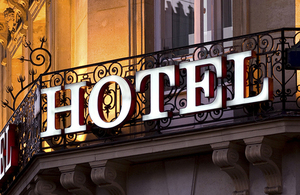CMA closes hotel online booking investigation
The CMA today announced that it has closed an investigation into suspected breaches of competition law in the hotel online booking sector.

The investigation was launched by the Competition and Markets Authority’s (CMA) predecessor, the Office of Fair Trading (OFT). It focused on restrictions in agreements between InterContinental Hotels Group and Hotel Inter-Continental London Limited (IHG) and each of Booking.com and Expedia, which prevented the online travel agents from discounting the price of room-only hotel accommodation (‘discounting restrictions’).
The OFT’s investigation was one of several investigations across Europe into a range of pricing practices in the online booking sector.
The OFT issued a provisional decision in July 2012 and accepted formal commitments from IHG, Booking.com and Expedia in January 2014. The Competition Appeal Tribunal (CAT) remitted the case back to the CMA for reconsideration in September 2014 following an appeal in respect of the commitments decision by Skyscanner.
Having reconsidered the matter in the light of the CAT’s judgment and following a fresh look at the case, the CMA has decided to close the investigation into discounting restrictions on administrative priority grounds. It will maintain a careful watch on how the market develops both in the UK and across Europe and will continue to liaise closely with fellow national competition authorities and the European Commission.
The CMA’s continued monitoring will include observing the effects of recent Europe-wide changes introduced by Booking.com and Expedia. These changes remove from their contracts with hotels certain ‘rate parity’ or ‘most-favoured-nation’ restrictions that prevent hotels from offering cheaper room rates on competing online travel agents’ sites than they offer on Booking.com or Expedia.
The new arrangements allow hotels across Europe to offer cheaper rates than on Booking.com or Expedia through other online travel agents, offline, and to certain groups of customers. Rate parity continues in relation to prices offered on hotels’ own websites and certain other direct sales channels.
Ann Pope, CMA Senior Director for Antitrust, said:
This is a sensible point for us to take stock and refocus our activity in this important sector. It is too soon to tell whether or not the changes made by Booking.com and Expedia will materially change how hotel rooms are priced on the internet. We will continue to watch this closely and welcome views about how the market is developing in light of these changes.
Vertical restraints in online markets, where a business imposes pricing or certain other restrictions on another business operating at a different level of the supply chain, remain a serious concern for the CMA where they result in consumers losing out. As always, we will give serious consideration to taking enforcement action in any sector where we suspect a breach of competition law which gives rise to consumer harm.
Notes for editors
- The CMA is the UK’s primary competition and consumer authority. It is an independent non-ministerial government department with responsibility for carrying out investigations into mergers, markets and the regulated industries and enforcing competition and consumer law. From 1 April 2014 it took over the functions of the Competition Commission and the competition and certain consumer functions of the Office of Fair Trading, as amended by the Enterprise and Regulatory Reform Act 2013. For more information see the CMA’s homepage on GOV.UK.
- For CMA updates, follow us on Twitter @CMAgovuk, Flickr and LinkedIn.
- The CMA has closed its investigation in relation to the following companies: * Booking.com B.V. (‘Booking.com’) and its ultimate parent company priceline.com Incorporated (‘Priceline’) * Expedia, Inc (‘Expedia’) * InterContinental Hotels Group plc; and Hotel Inter-Continental London Limited (‘IHG’)
- For the avoidance of doubt, the CMA has closed the case on the grounds it is not currently an administrative priority, and has not taken any decision as to whether the Competition Act 1998 and/or Treaty on the Functioning of the European Union has been infringed.
- Retail most-favoured-nation or ‘retail MFN’ clauses in the sector include, for example, where an online travel agent insists that the room prices hotels offer on the online travel agent’s site are the same or lower than the prices the hotels offer via other online travel agents, or the hotels’ own websites.
- Interested third parties with concerns about the operation of retail MFNs in the hotel online booking market in the UK should contact the CMA via the project page. After 12 months of monitoring market developments, the CMA will take the views it receives into account when considering whether or not to take any other steps.
- Enquiries should be directed to Simon Belgard (simon.belgard@cma.gsi.gov.uk, 020 3738 6472).